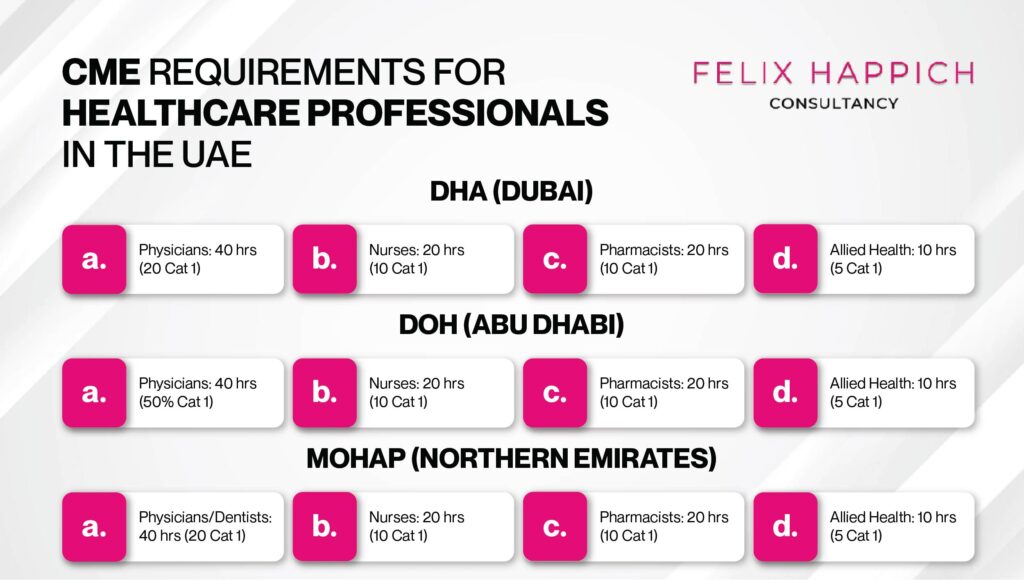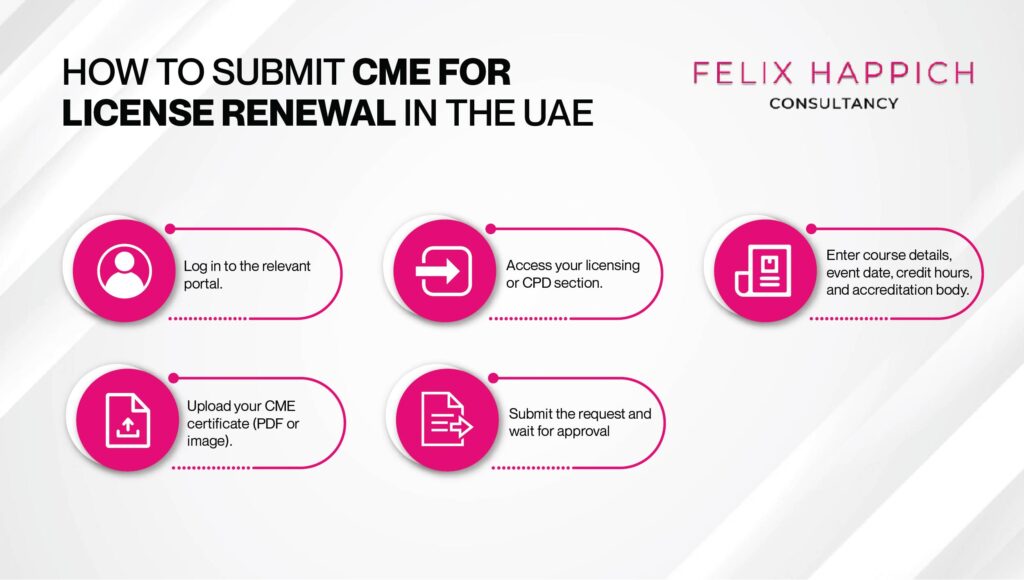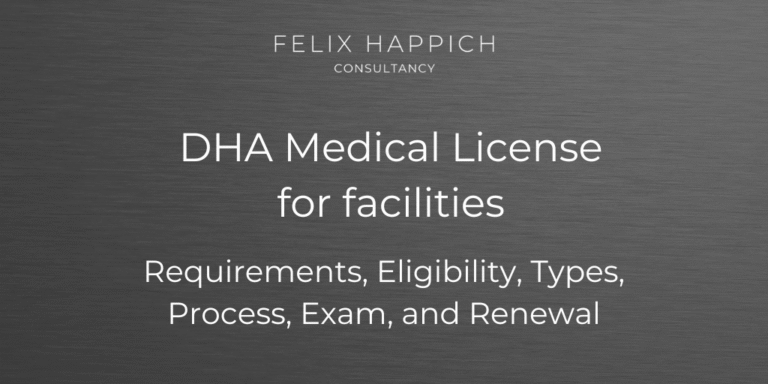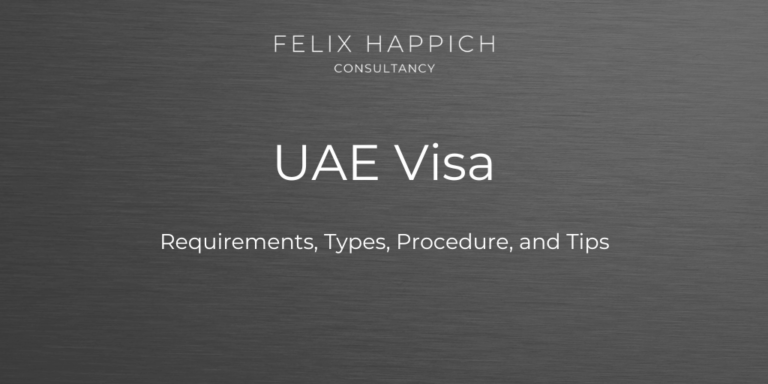Continuing Medical Education (CME) in the UAE is a structured learning process designed for healthcare professionals to update their medical knowledge and enhance professional performance, as mandated by MOHAP Circular 270 (2014). To ensure CME activities meet this mandate and maintain professional standards, there are specific requirements that differ by medical profession and licensing authority. For instance, physicians and dentists are required to complete 40 hours annually, nurses and pharmacists must complete 20 hours, and allied health professionals are required to complete 10 hours.
The healthcare system of the UAE has two types of CME, namely CME Category 1 and CME Category 2. CME Category 1 includes the formally approved activities, such as accredited conferences, workshops, and webinars. Category 2 CME covers self-directed learning like journal reading, departmental discussions, and guideline reviews. Medical professionals can choose from the CME Category 1 and CME Category 2 to complete their total CME credits required for license renewal. CME medical programs that are approved by the DHA, DOH, or MOHAP include events like the Arab Health Congress, hospital grand rounds, and specialised workshops.
Healthcare professionals can earn CME credits through government portals, hospital programs, approved conferences, self-study, and online CME programs. Medical professionals prefer online CME programs as they offer flexibility. However, DHA allows only up to 50% of the total CME credits online, only when they are interactive and accredited by the UAE-approved authorities. Popular online providers for CME credits are the DHA eLearning Portal, MENA CME, HealthPlus Academy, and Medscape.
Medical professionals in the UAE can also complete their CME credits through free options, including Medscape, DHA Library, MIMS Learning, Cleveland Clinic Portal, and BMJ Learning. They need to submit their certificates of completed CME credits in the respective portals like DHA Sheryan, DOH TAMM, or MOHAP eServices to renew their medical license. These certificates must have the participant’s name, event details, credit hours, accrediting body, and official stamp. In case healthcare professionals cannot complete their CME hours, the respective authority will delay or block license renewal, incur fines, or require reapplication.
What is Continuing Medical Education (CME)?
Continuing Medical Education (CME) is a structured learning process for healthcare professionals like physicians, nurses, and allied health workers to maintain their clinical competence, stay up to date with modern medical knowledge and technologies, and improve professional performance through new medical techniques.
CME is different for every type of healthcare professional in the UAE. For instance, the cardiologist focuses on cardiac advancements, while the psychiatrist learns about mental health law, therapy modalities, or psychopharmacology in their Continuing Medical Education.
What are the types of CME in the UAE?
The types of Continuing Medical Education in the UAE are Category 1 CME and Category 2 CME. The healthcare authorities of the UAE, such as the Dubai Health Authority, Department of Health – Abu Dhabi, and Ministry of Health and Prevention (MOHAP), categorized the medical educational activities into Category 1 CME and Category 2 CME based on their structure, accreditation, and validation.
Category 1 CME
The Category 1 CME (Continuing Medical Education) involves the medical education activities that are approved by the healthcare authorities, like DHA, DOH, and MOHAP. The healthcare authority of each UAE Emirate structures and organizes activity details, credits, and accreditation numbers, and awards participants with specific certifications.
The examples of Category 1 CME in the UAE are outlined below.
- Approved medical conferences like the Arab Health Congress and the AIDA Conference.
- Webinars or live online sessions like DHA Weekly CME Webinars and MOHAP Virtual Learning Series.
- Discussions like the Cleveland Clinic Abu Dhabi Grand Rounds and Mediclinic Grand Rounds.
- Workshops and courses like BLS / ACLS Workshops and Ultrasound in Emergency Medicine Workshop.
Category 2 CME
Category 2 CME (Continuing Medical Education) are the informal or self-directed medical educational activities that do not have official approval from healthcare authorities like DHA, DOH, and MOHAP. The healthcare professionals choose these activities by themselves and log them as their Category 2 CME, as these authorities have not structured and certified these activities.
The examples of Category 2 CME in the UAE are mentioned below.
- Medical journals or clinical research papers like NEJM, The Lancet, and JAMA.
- Updated clinical guidelines, like ADA diabetes care guidelines, and WHO protocols.
- Departmental case discussions, internal hospital audits, and mentoring junior staff and medical students.
- Internal hospital meetings and journal clubs or morbidity & mortality meetings.
Is CME Mandatory for Healthcare Professionals in the UAE?
Yes, Continuing Medical Education (CME) is mandatory for all healthcare professionals in the UAE as per Circular (270) 2014 of the Ministry of Health and Prevention (MOHAP). The medical professionals need to fulfill the minimum CME hours per year to maintain their license in the UAE. These minimum hours of CME differ for every type of healthcare professional. For instance, it is 40 hours per year for physicians and dentists, and 20 hours of CME for nurses and pharmacists.
Why is CME important for UAE healthcare professionals?
The CME is important for UAE healthcare professionals to maintain their licenses, renew them annually, and stay updated with the latest medical knowledge, technologies, and evidence-based medical practices. The DHA Sheryan portal and the Department of Health – Abu Dhabi do not accept a license renewal application without the minimum CME hours. The minimum hours of CME are also mentioned in the Unified Professional Qualification Requirements (PQR) as a criterion for the license renewal or continuation, as mentioned on the official website of MOHAP.
What are the CME requirements in the UAE?

The Continuing Medical Education requirements in the UAE are 40 CME hours per year for physicians and nurses, and 20 CME hours per year for nurses and pharmacists. The medical professionals should cover at least 20 hours from the Category 1 CME, which should be recorded and certified. They can complete the remaining 20 hours through Category 2 CME, which are not certified or credited.
CME Requirements by Health Authority
Every Healthcare Authority has designed specific CME requirements for its medical professionals working in it. The CME requirements vary slightly according to the healthcare authority, as mentioned in their Professionals Qualification Requirements (PQR).
- Requirements for DHA
The Dubai Health Authority (DHA) mentions the CME requirements in its Professional Qualification Requirements (PQR), which are outlined below.
- 40 CME hours for physicians (Consultants and Specialists) that include at least 20 hours Category 1 CME activities.
- 20 CME hours for nurses and pharmacists that include at least 10 hours of Category 1 CME activities.
- 10 CME hours for Allied Health Professionals that include a minimum of 5 hours Category 1 CME activities.
- Requirements for DOH
The Department of Health – Abu Dhabi mentions the CME requirements for medical professionals in the “CME Program for Applicant Detail” on the official website of DOH.
- 40 CME hours for consultants and specialists who require a minimum of 50% Category 1 CME hours.
- 20 CME hours for nurses and pharmacists, which require a minimum of 10 hours from Category 1 CME.
- 10 CME hours for Allied Health Professionals, which include at least 5 hours from Category 1 activities.
- Requirements for MOHAP
The Ministry of Health and Prevention (MOHAP) has mentioned the CME requirements in the Unified Professional Qualification Requirements (PQR) for Sharjah, Ajman, Fujairah, Ras Al Khaimah, and Umm Al Quwain.
- 40 CME hours for physicians and dentists, which require a minimum of 20 hours from Category 1 CME.
- 20 CME hours for nurses and pharmacists, with a minimum of 10 hours from Category 1 CME.
- 10 CME hours for Allied Health Professionals with a minimum of 5 hours from Category 1 CME.
CME Requirements by Profession
The CME requirements of medical professionals in the UAE are outlined by the Healthcare Authorities, like DHA, DOH, or MOHAP. These requirements vary for each type of medical profession as outlined below.
- Doctors
The doctors (consultants and specialists) and dentists need to complete at least 40 hours of CME per year. These hours include a minimum of 20 hours from Category 1 CME and a maximum of 20 hours of Category 2 CME.
- Nurses
The nurses are required to fulfill 20 hours of CME in a year, which includes at least 10 hours from Category 1 CME and a maximum of 10 hours from Category 2 CME.
- Allied Health Professionals
The Allied Health Professionals are required to complete 10 hours of CME annually to continue their services in the UAE.
- Pharmacists
The pharmacists in the UAE need to complete 20 hours of CME in a year. They can include 10 hours from Category 1 CME and 10 hours from Category 2 CME.
Which CME Programs Are Accredited in the UAE?
The CME programs that are accredited in the UAE are live conferences, scientific seminars, workshops, training courses, webinars, and online modules. These programs meet the educational criteria of the UAE and are approved by healthcare authorities like the DHA, DOH, and MOHAP. Here is the list of CME programs that are accredited in the UAE.
- Live conferences and scientific seminars are organized by medical universities, hospitals, and medical associations. These seminars must be approved by the respective healthcare authorities, like DHA, DOH, or MOHAP. The Arab Health Congress and SEHA International Scientific Conference are the most common examples of CME programs that are accredited in the UAE.
- Workshops, training courses, and hands-on sessions like ACLS, BLS, PALS, infection control, and radiology interpretation. These CME programs are accredited by the authorities like DHA, DOH, or MOHAP and are listed on CME portals.
- Webinars and online modules are hosted by educational platforms of the UAE, such as MENA, CME, HealthPlus, and the DHA e-learning portal.
- Hospital grand rounds and case discussions, which include internal CME programs in MOHAP, DHA, or SEHA-affiliated hospitals.
UAE-recognized accreditation bodies
The UAE-recognized accreditation bodies are the Dubai Health Authority (DHA), Department of Health – Abu Dhabi, and the Ministry of Health and Prevention (MOHAP). These accreditation bodies approve live conferences, clinical workshops, and internal hospital programs.
The UAE-recognized accreditation bodies are outlined below.
- Dubai Health Authority (DHA)
- Department of Health – Abu Dhabi (DOH)
- Ministry of Health and Prevention (MOHAP)
- SEHA (Abu Dhabi Health Services Company)
- MENA CME Platform
- HealthPlus Academy
- Accredited Medical Universities and Associations like Arab Health Congress, UAE University, and Emirates Medical Association
International CME acceptance criteria
The international CME acceptance criteria are outlined below.
- CME program must be accredited by the internationally recognized accrediting bodies like ACCME (Accreditation Council for Continuing Medical Education), RCPSC (Royal College of Physicians and Surgeons of Canada), EACCME (European Accreditation Council for Continuing Medical Education), GMC (General Medical Council), or AMC (Australian Medical Council).
- CME programs must be based on medical research, follow current clinical guidelines, and use proven methods from real patient care to ensure that the CME content is accurate, safe, and relevant to medical practice.
- CME programs must be aligned with the professional scope, such as license type, specialization, and practice setting.
- CME programs should provide a CME certificate that includes the participant’s name, the event title and date, the CME provider and accrediting body, and the exact number of CME credit hours earned.
How to verify a CME course’s approval status?
To verify a course’s approval status, consider the following steps:
- Confirm that the CME course is approved by DHA, DOH, MOHAP, or any other internationally recognized body like ACCME and EACCME.
- Use the official CME portals for the respective Emirate, like the Sheryan portal for DHA, TAMM portal for DOH, and the MOHAP CME portal for MOHAP.
- Consider the details like accreditation ID, event code, approving body name, and validity period of the course.
- Ask the organizer to confirm that the course has been approved by the UAE authority and has an accreditation reference.
- Submit the CME program to the relevant licensing authority for pre-approval before attending.
Where to Earn CME Credits in the UAE?
Medical professionals earn CME credits in the UAE from multiple channels, like government portals, hospital CME programs, and accredited conferences. Every channel provides credits through different ways, like government portals, like the DHA e-learning portal comes with free or low-cost modules, webinars, and course access. On the other hand, hospital CME programs include grand rounds, journal clubs, and case presentations for earning CME credits.
- Government Portals
- Hospital CME Programs
- Accredited Conference and Workshop Events
- Self-Study and Academic Submissions
1. Government Portals
Government platforms offer free or low-cost modules, webinars, and course access. The platforms from which UAE medical professionals earn CME credits are outlined below.
- DHA e-learning portal
- DoH CME platform
- MOHAP CME system
2. Hospital CME Programs
The hospital CME programs are available in MOHAP, SEHA, and DOH-affiliated hospitals. The healthcare professionals earn CME credits by participating in the in-house sessions, which are outlined below.
- Grand rounds
- Journal clubs
- Case presentations
- Departmental lectures
3. Accredited Conference and Workshop Events
The medical professionals earn CME credits by attending events pre-approved by the UAE health authorities and listed in the DHA, DOH, and MOHAP CME directories. These events include accredited conferences and workshop events, which are outlined below.
- Arab Health Congress
- SEHA Scientific Conference
- Workshops like BLS, ACLS, and infection control
4. Self-Study and Academic Submissions
The UAE healthcare professionals earn CME credits through self-study and academic submissions. They need to make sure that they submit proper supporting documents along with self-study programs for credit approval. The self-study and academic submissions used for earning credits are given below.
- Publishing in peer-reviewed journals
- Preparing case reports or scientific posters
- Participating in recognized e-learning modules
Online CME in the UAE
Healthcare professionals can earn CME credits through digital platforms by attending webinars, modules, or virtual workshops, which are approved by the UAE health authorities. Online CME in the UAE provides flexibility, cost-effectiveness, credits, and scalability. The online CME programs, which are approved by the UAE authorities, are webinars with question and answer sessions, interactive case-based modules, virtual live conferences, and recorded lectures with quizzes.
The medical professionals should choose the online CME programs in the UAE by considering the factors outlined below.
- DHA Online CME Rules
The DHA online CME rules are outlined below.
- Medical professionals can earn up to 50% of their CME credits through online programs.
- Healthcare professionals should choose the online CME that is from DHA-approved platforms or internationally accredited providers like ACCME and EACCME.
- An online CME program must award medical professionals with a certificate that states the number of credits and accrediting authority.
- DHA medical professionals should choose a CME course that has a post-course assessment or a quiz.
- DOH Online CME Exclusions
The DOH online CME does not accept programs that have no interactivity, such as passive reading or video watching without assessments. The DOH authority also rejects the CME programs that do not provide validated certificates. The healthcare professionals should consider the online CME programs that come with the following features.
- Active participation
- Learning objectives
- Verification of knowledge gain
- Top Online CME Providers in the UAE
The top online CME providers in the UAE that meet the standards set by the DHA, DOH, and MOHAP are listed below.
- The DHA e-Learning Portal, approved by the Dubai Health Authority, offers free courses and quizzes with Dubai-specific content, and is accessible through the Sheryan Portal.
- MENA CME, approved by DHA and DoH, provides live webinars, recorded modules, and regional healthcare topics through its website mena-cme.com.
- HealthPlus Academy, approved by DHA and DoH, offers specialty-specific CME modules such as cardiology and diabetes, and is accessible through registration or hospital partnership.
- SEHA e-CME Portal, approved by DoH through SEHA hospitals, provides grand rounds and internal CME sessions for SEHA network professionals.
- Medscape CME, approved by DHA, DoH, and MOHAP through ACCME, offers international, up-to-date, and specialty-wide medical topics via medscape.org.
- CMEList aggregates accredited CME from global sources like Mayo Clinic, Harvard, and Cleveland Clinic, with select programs recognized by DHA and MOHAP, accessible at cmelist.com.
How to Track and Log Your CME Hours?
You can track and log your CME hours by manual tracking with a Word or Excel sheet or through mobile tracking apps. The medical professionals should scan and attach all the supporting documents along with all the entries.
You can track and log your CME hours through the ways outlined below.
- Manual Tracking with a Template
Manual tracking of CME hours and credits involves using a custom Excel and Word template. This template should have columns or rows for course title, date completed, CME hours earned, and accrediting body. You must attach the scanned version of certificates and supporting documents in front of each section. The medical professionals should update the CME tracking sheet immediately after they have completed the course.
- Mobile Apps or Spreadsheets
You can record the CME credits and hours through different mobile CME trackers, such as CME Tracker, MyCME, and Evernote. These CME tracking apps come with year, provider, and specialization that make them easy to manage. Some CME tracking apps are synchronized with licensing authority portals if the app owners have integrated them.
What is the Best Way to Earn CME Quickly?
The best ways to earn CME quickly are choosing the online CME platforms, using mobile apps, participating in virtual events, listening to the CME podcasts, and completing self-assessment questions.
The best ways to earn CME (Continuing Medical Education) credits quickly, specifically for CME Category 1 requirements, are outlined below.
- You can maximize your CME credits by using accredited online platforms like Medscape, myCME, FreeCME, and those approved by UAE authorities (such as DHA, DOH, or Cleveland Clinic Abu Dhabi), which offer courses and live webinars that allow you to earn multiple CME hours quickly, get instant certification, and study anytime, anywhere.
- Medical professionals can increase their CME hours with mobile apps like Medscape and myCME. These apps help medical professionals to complete accredited activity anytime, send reminders, issue instant certificates, offer specialty-specific content, and auto-track CME credits to meet requirements faster.
- Healthcare professionals can maximize CME hours through accredited virtual events, which include CME-approved webinars, symposia, and online conferences. Such formats offer multiple credits in a short time, allowing several hours to be earned in just one day or weekend.
What are the Penalties for having Incomplete CME Credits?
- Failure to meet the required CME/CPD hours by the renewal deadline can delay or deny your medical license renewal. The Dubai Health Authority (DHA) requires a minimum annual CME/CPD hours before processing. Renewal attempts without completed credits will be blocked. Licenses that have expired for over six months face automatic cancellation, requiring reapplication as a new applicant with added scrutiny and delays.
- Medical professionals who fail to comply with the CME requirements may face financial penalties of AED 1,000 to AED 5,000. The exact amount of the fine is not mentioned publicly on the official website of the Dubai Health Authority.
- The Dubai Health Authority (DHA) may require re-assessment or re-examination of healthcare professionals whose CME hours or credits have expired for a longer period of time.
Free CME Sources for Healthcare Workers in the UAE
The free CME sources for healthcare workers in the UAE are outlined below.
- Medscape (medscape.com) offers free international CME/CPD courses, case studies, and quizzes across different medical specialties, with downloadable certificates accredited by authorities like ACCME.
- DHA Library (dha.gov.ae) offers free DHA-approved CME/CPD webinars, journals, and courses, which record the credits automatically in the Sheryan portal for Dubai-licensed healthcare professionals.
- MIMS Learning (mimslearning.com) provides free clinical CME modules, guidelines, and case studies, which provide certificates from internationally accredited providers accepted by UAE licensing authorities.
- Cleveland Clinic Portal (clevelandclinicmeded.com) delivers free specialist medical education via webcasts, articles, and case-based learning, and provides AMA PRA-accredited certificates recognized by UAE regulators.
- BMJ Learning (learning.bmj.com) offers evidence-based CME modules in multiple specialties and provides medical professionals with internationally accredited certificates.
How to Submit CME for License Renewal in the UAE?

Submitting CME for license renewal in the UAE involves logging into your licensing authority’s online portal, uploading your CME or CPD certificates with proper details, activity titles, dates, credit hours, and accreditation proof. The licensing authority will verify these certificates and add credits to your profile, which will allow you to renew your license.
Submitting via DHA Sheryan
Submitting CME through the DHA Sheryan portal involves the following steps.
- Log in to the DHA Sheryan portal.
- Open your profile.
- Select the “Continuing Professional Development (CPD) Submission.”
- Upload all the CME certificates along with the activity title, event date, number of credit hours, and accreditation proof from the DHA, DOH, or MOHAP.
- Click on the submit button and wait for the approval, which takes 3 to 5 days.
Submitting via DOH TAMM
You can submit CME credits through the TAMM platform linked to your DOH account by following the steps outlined below.
- Open the TAMM platform.
- Log in using the UAE pass.
- Navigate to the “Healthcare Professionals Licensing.”
- Choose “CME/CPD Credit Submission.”
- Upload the Course Name, Date of Completion, CME Credit Hours, and Accreditation Body Details.
- Click on the submit and wait for the approval, which will take 2 to 5 days.
MOHAP Submission Guidelines
Submission of CME credits through the MOHAP account involves the following steps.
- Log in to the MOHAP eServices.
- Select the “Professional Licensing” and then “CME/CPD Submission”.
- Enter activity details like course or event details, date of completion, location, and name of organizer or provider.
- Write the exact CME credit hours earned and upload the accreditation proof from an accredited body (MOHAP, DHA, DOH).
- Upload the CME certificate in PDF or image format with a maximum size of 2 MB.
- Click on the submit and wait for the approval within 2 to 4 days.
CME Certificate Format Requirements
The CME certificate should be submitted in the following format.
- Write the full name of the participant that matches licensing records.
- Use the complete activity title that includes the course name, workshop, or conference.
- Give proper dates for all the CME activities.
- Write the correct number of CME or CPD credit hours.
- Mention the name of the accrediting body that can be MOHAP, DHA, or DOH.
- Provide the reference number of the CME credits.
- Write the mode of delivery of CME hours.
- Provide the official signature and stamp of the CME credits provider.
Frequently Asked Questions
CME in the UAE is not always free. Some hospitals, medical universities, and professional associations, such as SEHA, MOHAP, and DHA, offer free CME/CPD events for registered professionals, especially for in-house staff or members. Many accredited courses, webinars, and international conferences require payment. This includes specialty workshops and programs from private training providers.
Yes, you can use CME from any other country if it is accredited by an institution that is recognized by the Dubai Health Authority (DHA), Department of Health (DOH), Ministry of Health and Prevention (MOHAP). The CME programs completed from international organizations like ACCME (USA) and EACCME (Europe) are accepted.





